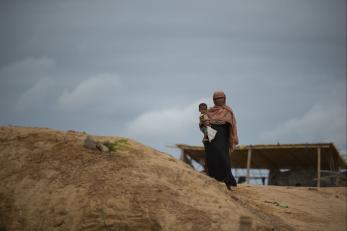Planting Seeds of Resilience in Humanitarian Settings

The Rohingya influx in August 2017 into Cox’s Bazaar, Bangladesh resulted in the world’s largest refugee ‘camp’ and complex humanitarian crisis. A year later, Rohingya refugees and Bangladeshi host communities continue to face natural hazards and built risks, including makeshift shelters built in areas prone to landslide, flooding, wild animals and pests, poor water, sanitation and hygiene access. Limited food and fuelwood provisions are driving food insecurity, environmental degradation and social tensions, and a lack of mobility and income generation opportunities perpetuate aid dependency and vulnerability. Humanitarian minimum standards have been a challenge to achieve, due to systemic constraints (land availability, the speed and scope of the influx, policies, among others) and refugees often having to resort to negative coping strategies to survive, compromising their wellbeing and undermining future resilience capacities.3 Systematic denial of human rights in Myanmar and restrictions to attainment in Bangladesh, combined with the lived experience of ethnic violence, historic marginalization and concomitant displacement, has also created a baseline of maladaptation to risk.
Mercy Corps in partnership with IOM Bangladesh recognized a need to better understand interlocking vulnerabilities across a range of social, environmental, physical, personal, economic, and political factors and to further identify capacities and resources available to crisis affected persons to address negative dynamics. Linking Disaster Risk Reduction (DRR), Resilience and Protection approaches the partnership set a foundation to apply a resilience lens to a complex humanitarian context in which populations are exposed to multiple forms of violence, coercion, and deprivation. During April-May 2018 Mercy Corps supported the rollout of a Rapid Strategic Resilience Assessment4 utilizing an adapted Participatory Disaster Risk Reduction & Resilience framework, that enables a systems approach to understand vulnerabilities and risk in a more holistic manner.

